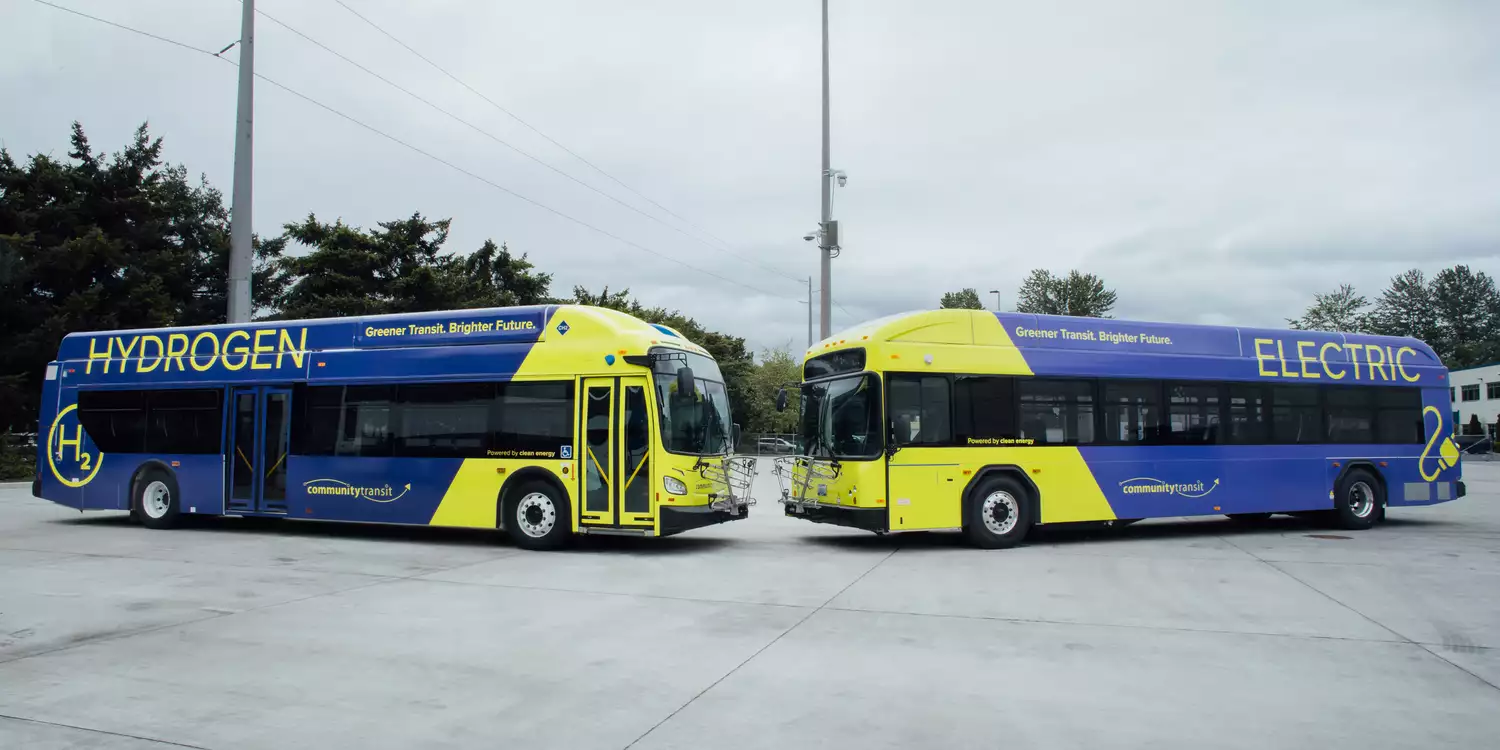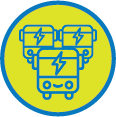
Greener Transit. Brighter Future.
Every time you ride transit instead of driving a car, you are making the planet greener. At Community Transit, we’ve prioritized sustainability and we’re going one step further to preserve our beautiful environment in Snohomish County: We are targeting a transition to a fully zero emissions fleet by 2044. This shift from diesel-powered to zero emissions buses represents the agency's most substantial investment to date.
Getting there
The shift to zero emissions buses is a priority for Community Transit and will help shape the future of mobility in Snohomish County. Along with new buses, there will be changes to our agency’s facilities, technology, operations, and training programs. Community Transit has undertaken a years-long study to evaluate and develop an operationally, fiscally, and environmentally sustainable strategy that will benefit transit riders and our community for generations to come.
On our way
In 2024, Community Transit concluded testing of a 60-foot battery electric bus (BEB) — maybe you saw it on the road. Our bus drivers and mechanics were “kicking the tires” and learning how these buses drive and are maintained. Some key takeaways from this study include:
- Varied topography produces different results. For example, hilly terrain will use greater battery consumption versus flat roadways.
- Training is important. Bus driver familiarity with operating the BEB has a great impact on overall efficiency and range of the vehicle.
- Extreme hot or cold weather can be tough on batteries and significantly reduce their range.
Drivers who tested the BEB say, "It drives like a bus!" and "It's smooth and quiet, making it enjoyable to drive." These comments highlight how easy and comfortable it can feel to transition to a bus powered by clean energy.
The zero emissions fleet transition will provide a chance to train existing employees for the evolving landscape of electric transportation. Moreover, it will provide job opportunities at Community Transit in areas like maintenance, infrastructure, and fleet management.
The road ahead
Community Transit is testing a 40-foot battery-electric bus (BEB) and a 40-foot hydrogen fuel cell electric bus (FCEB). With both zero emissions buses out on the road, we will compare the two types of electric buses and you’ll get a chance to try out this new type of ride! Lessons learned from these initial investments will determine a long-term strategy to transition the entire fleet to zero emissions as outlined in the Zero-Emission Bus Transition Plan.
Since starting our pilot test in late 2024, we have driven over 11,000 miles on the BEB. Our performance data has informed training strategy, vehicle capability modeling, and bus engineering decisions to support all-weather operations. Our operators love driving the BEB and are looking forward to expanding our electric fleet in the coming years.
To support this fleet transition, the agency is also looking at making changes to current bus maintenance and storage facilities. We are working on a design that includes charging stations at Community Transit’s Hardeson Campus Service and Operations base and hydrogen storage at the Kasch Park Operations base.
Leading the charge with hydrogen fuel
Community Transit is actively piloting a hydrogen fuel cell bus (FCEB), gathering critical insights to inform decision-making around future mixed propulsion fleets. While local hydrogen production remains several years away, we are actively engaged in regional and national conversations focused on hydrogen production, distribution, and long-term scalability. Local, regional, and national partnerships and collaboration will be key as we move toward the sustainable deployment of clean transportation technology.
Stay tuned and share your feedback
Community organizations have had the opportunity to learn about the zero emissions program and give feedback on benefits and impacts to local communities.
Future opportunities to engage with the program include:
- Field trips aboard a zero emissions bus
- Online open house to learn more and a survey to give input
- Learning about workforce development opportunities and partnering with Community Transit
- Regular updates via Community Transit’s website and social media
If you have questions or want to comment on the zero emissions program, send an email to engage@commtrans.org.
Roadmap to zero emissions fleet and infrastructure



Phase 1:
- Feasibility Study
- PUD Impact Study
- Deploy BETA Pilot



Phase 2:
- Fleet Transition Plan Development
- Grant Applications (Low-No + US EPA CPRG)
- Facility Design Study
- BEB Pilot Prepartions & Fleet Testing



Phase 3:
- BEB Pilot Prepartions & Fleet Testing
- Deploy BEB Pilot
- Deploy FCED Pilot



Phase 4:
- Capital Projects
- Fleet Procurements
- Training / Workforce Development
- ~25% Fleet Transition by 2030
Documents
Click below to view and download the Zero Emissions Program fact sheet.
Click below to download the FTA-compliant 2024 Fleet Transition Plan, which outlines the agency’s effort to transition its revenue bus fleet to zero emission technology by 2044.

